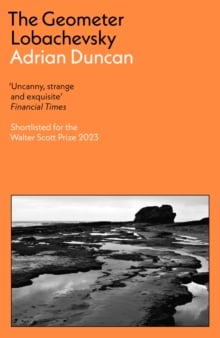
“The Geometer Lobachevsky” by Adrian Duncan
Adrian Duncan is a new discovery for me. The unusual title of this book made it stand out from the mass of new books I see each week and the endorsement by Colm Toibin helped highlight the Irish origins, so well disguised.
The location is the Irish Republic in 1950, still a relatively new Independent country and whilst neutrality protected it from WW2, poverty and a rural based economy and community are evident within the opening section which is based in the Irish Midlands where Nikolai Lobachevsky is assisting a team of locals led by a man called Rhatigan to survey a bog. Nikolai is a Russian, this is the era of Stalin, his trip abroad had been approved but he receives a letter summoning him home. He intuitively knows this is a death sentence and ignores it continuing to assist the small team of locals to geometrically assess the bog. Rhatigan is a man with a Republican past; a forceful moody individual. A good mixture of other locals enliven this section, much being centred on the local pub, where Nikolai is staying.
This summons and other events which unfold make Nikolai move on, acquiring a new identity as protection. He ends up being part of a very small community on an island in the Shannon Estuary. Here all the families have very similar surnames. They harvest seaweed and Nikolai helps different families and is living a peaceful, seemingly secure life. Again insight into rural lives add to this section and in particular his friendship with one of the island’s sons, Paulie Og. The death of Stalin brings optimism to Nikolai that his life in hiding could come to an end but there are unusual events on the island that transpire before he makes his first move.
Once again it is a return to the Irish Midlands and Rhatigan where Nikolai sees how his earlier efforts have progressed to encompass the Irish Turf Board and the industrialised removal of the local natural resource of peat. This is a mere stepping stone for Nikolai’s journey back across the Continent to reconnect with his family.
Andrew Duncan writes very well; the odd sentence stopping this reader in mid flow to appreciate the phraseology and sometime in the future I will certainly read his earlier work. The feel for the Irish countryside is excellent, whether it be the peatland of the Midlands or the insular surroundings within the Shannon Estuary. The storyline is unusual in so much as the setting is very rural Ireland while the politics are Soviet under and post the Stalin era.
